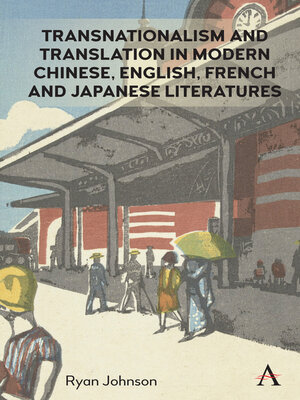Transnationalism and Translation in Modern Chinese, English, French and Japanese Literatures
ebook ∣ Anthem Studies in Global English Literatures
By Ryan Johnson

Sign up to save your library
With an OverDrive account, you can save your favorite libraries for at-a-glance information about availability. Find out more about OverDrive accounts.
Find this title in Libby, the library reading app by OverDrive.



Search for a digital library with this title
Title found at these libraries:
| Library Name | Distance |
|---|---|
| Loading... |
The theory of "literary worlds" has become increasingly important in comparative and world literatures. But how are the often-contradictory elements of Eastern and Western literatures to cohere in the new worlds such contact creates? Drawing on the latest work in philosophical logic and analytic Asian philosophy, this monograph proposes a new model of literary worlds that is best suited to comparative literature dealing with Western and East Asian traditions. Unlike much discussion of world literature anchored in North American traditions, featured here is the transnational work of artists, philosophers, and poets writing in English, French, Japanese and Mandarin in the twentieth century. Rather than imposing sharp borders, this book suggests that vague boundaries link Eastern and Western literary works and traditions, and that degrees of distance can better help us to see the multiple dimensions that both distinguish and join together literary worlds East and West. As such, it enables us to grasp not only how East Asian and Western writers translate one another's works into their own languages and traditions, but also how modern writers East and West modify their own traditions in order to make them fit in the new constellation of literary worlds brought about by the complex flow of literary information across twentieth-century Eurasia.
|This book addresses several important questions in the fields of modern, comparative, and world literatures. At a time in which "weak theory" and transnationalism are becoming increasingly pressing topics, the volume considers the utility of philosophical logic, literary worlds, and analytic Asian Philosophy to understand world literature. In doing so, it investigates the ways in which Chinese, English, French, and Japanese writers eager to tackle the challenges of modernity gazed both across the Eurasian landmass and back in time to their own traditions.
Transnationalism and Translation in Modern Chinese, English French, and Japanese Literatures contends that world literature consists of many smaller literary worlds that are founded upon and made to conform with the deep-level ontological assumptions of their native tradition. The translation of texts across times and cultures introduces new logical possibilities to literary traditions and the writers who sustain them. Yet each translation also amounts to the creation of a new literary world, in which the ontological assumptions of the original are made to cohere according to the possibilities afforded by the culture into which the text is translated. This clash of ontologies, often overlooked in world literary studies, forms the basis of modern translational literature.
This book presents four comparative case studies. It begins with Ted Hughes' and Chou-wen Chung's attempt to make the Bardo Thödol express the desires of an expatriate American-Chinese composer and a rising English poet in the 1950s; passes by Paul Claudel's and Mishima Yukio's mid-century adaptations of medieval Nō theatre; looks at Claudel's and Kuki Shūzō's efforts to make the poetry of the Kokin Wakashū and premodern Japan accord with the experience of being an expatriate in 1920s Tokyo and Paris; and finishes with Hughes' and Bei Dao's endeavours to place themselves as heirs to the traditions of both China and Europe. It is these fortuitous but often ignored points of contact between East and West, ancient and modern, that exemplify the challenges and possibilities of transnationalism, allowing for an innovative new way of comprehending the multidirectional flow of world literature.







